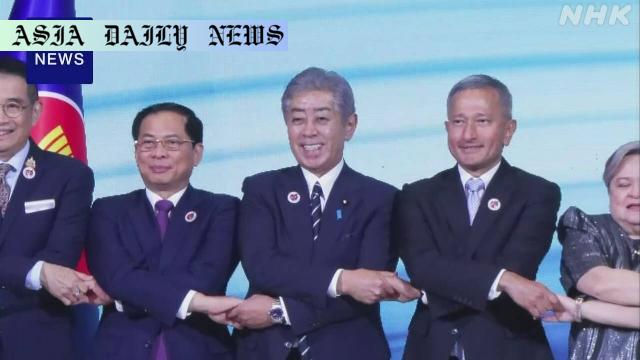Economic Cooperation – Japan’s FM calls for deeper ASEAN collaboration on trade.
Japan calls for stronger economic partnerships with ASEAN.
Focus on multilateral trade systems and WTO regulations.
Emphasis on areas like green and digital transformation.

Strengthening Economic Bonds Between Japan and ASEAN
Japan’s Foreign Minister, Iwaya Takeshi, has called for a renewed and deepened economic partnership with the Association of Southeast Asian Nations (ASEAN). In light of global trade tensions and an increasingly uncertain international landscape, Iwaya emphasized the need to reinforce collaboration between Japan and the ASEAN bloc to maintain resilience and competitiveness. Speaking during the ASEAN-Japan Foreign Ministers’ Meeting in Kuala Lumpur, Malaysia, he outlined a comprehensive vision to navigate these complexities together.
This call is timely, as the global trade ecosystem is under strain from rising protectionism and unpredictable trade policies. Iwaya’s emphasis on fostering a free, fair, and open international economic order reflects Japan’s commitment to multilateral trade frameworks and its reliance on well-functioning systems like the World Trade Organization (WTO). He stressed that a cohesive ASEAN-Japan strategy could serve as a counterbalance to shifting global trade dynamics and benefit the participating economies mutually.
Building on Existing Economic Frameworks
The minister underscored the importance of leveraging existing trade agreements and collaborations, including the Regional Comprehensive Economic Partnership (RCEP) and the Comprehensive and Progressive Agreement for Trans-Pacific Partnership (CPTPP). By utilizing these frameworks, both Japan and ASEAN nations can unlock stronger economic ties, accelerate regional growth, and enhance market access for businesses across Asia. This approach also aligns with Japan’s objective of developing strategic partnerships within the region, fostering shared prosperity while addressing economic challenges.
Additionally, Iwaya highlighted the significance of green and digital transformations as key drivers of future economic growth. The transition to sustainable practices and advanced technological capabilities is not only important for economic progress but also for addressing pressing social challenges like climate change and inequality. The minister called for collaborative initiatives to support these areas, suggesting that ASEAN and Japan could lead in these transformative journeys.
Enhancing Regional Connectivity through Personnel Exchange
Another significant aspect of Japan’s proposal was the emphasis on expanding personnel exchanges between ASEAN member states. By boosting people-to-people ties, Japan aims to encourage cultural understanding, technical skill development, and professional collaborations that could benefit the region collectively. Iwaya stressed that these exchanges could provide long-term benefits by fostering innovation, capacity building, and mutual learning—fostering lasting partnerships beyond the economic sphere.
Such exchanges are essential not only to enhance the region’s intellectual and cultural fabric but also for advancing bilateral collaborations in critical fields such as technology, education, and healthcare. This strategic priority dovetails with Japan’s larger vision of achieving holistic growth within the Asia-Pacific region, where economic gains are complemented by social advancements.
Looking Ahead: A Collaborative Path
By calling for deeper economic discussions and proposing robust collaboration frameworks, Japan signals its eagerness to strengthen its relationship with ASEAN nations. The focus on key global challenges—like rising protectionism, sustainability, and digitalization—not only ensures mutual benefits but also underscores Japan’s leadership in fostering global economic stability. This approach holds promise for creating a thriving and resilient region equipped to weather future uncertainties.
As ASEAN and Japan engage in further dialogue, the implementation of these strategic measures will determine the efficacy of their shared vision. Together, they could set an example for effective regional cooperation in challenging times, reaffirming the significance of multilateralism in a rapidly evolving global landscape.
Commentary
A Well-Timed Call for Economic Unity
The economic challenges presented today—from trade wars to global uncertainties—showcase the necessity for partnerships like the one Japan advocates with ASEAN. Minister Iwaya Takeshi’s call carries immense significance, particularly as nations look for collaborative solutions to navigate mounting trade tensions. By focusing on deeper integration and renewed commitments to multilateral frameworks like the WTO, Japan delivers a timely reminder of the value of collective action in fostering economic stability.
Enhancing Multilateral Systems
The proposed emphasis on longstanding partnerships through agreements such as RCEP and CPTPP presents a sound strategy not just for economic growth but also for stability amidst geopolitical turbulence. It highlights Japan’s vision to champion trade liberalization and fair practices amidst shifting economic tides. This also aligns with the larger international sentiment for reinforcing multilateral systems, which were designed to ensure shared accountability and long-term growth, even during complex global shifts.
Focusing on Sustainable Transformations
Japan’s focus goes beyond simply trade; the inclusion of green and digital transformation speaks volumes about the forward-thinking approach essential in current times. As these areas rapidly evolve, leading progress across the ASEAN region by incorporating shared strategies can act as a game-changer. Additionally, personnel exchanges will lay the groundwork for long-term regional advancements. It’s not just economic synergy but a sustainable future that they are advocating for, making these proposals both relevant and inspiring.


